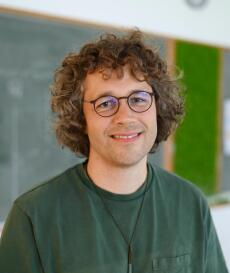Neuer Gastwissenschaftler: Volker Schlue

We welcome Dr. Volker Schlue as a Visiting Scholar (on leave from the University of Melbourne). His stay is funded by the Humboldt Foundation. Volker is a promising mathematician in general relativity and nonlinear wave equations. He joined our Cluster in April 2024, and is also a participant of the thematic program on Nonlinear Waves and Relativity at the ESI, in Vienna, in Mai/June 2024. During his extended stay at our Cluster until February 2025, he will contribute actively to all activities in the research group of Prof. Gustav Holzegel.
Dr. Schlue has made several contributions to his field:
- In his work with Spyros Alexakis (JDG 2018), he proved that genuinely time-periodic solutions to the Einstein vacuum equations do not exist, and thus removed a strong assumption of analyticity of the metric in previous works on the subject. The degenerate Carleman estimates proven in this context jointly with Arick Shao, turned out to be very useful in other "rigidity" settings.
- A major theme in his work is the study of expanding black hole cosmologies (CMP 2015, APDE 2022), in which he pursues a proof of the stability of Kerr-de Sitter spacetimes in the expanding region; a result that would complement the celebrated work of Hintz and Vasy (Acta 2018) on the stability of Kerr-de Sitter black holes.
- In collaboration with Hans Lindblad, he is developing a scattering theory for nonlinear wave equations, which is motivated in particular by the scattering problem for gravitational waves. Two recent papers with Lindblad have pioneered such a scattering theory for model problems of Einstein's equations in harmonic coordinates, and a recent paper with Martin Taylor extends this approach to kinetic equations.
While Volker's approach is very geometric, both items (2) and (3) also have intimate connections with complementary approaches in microlocal analysis. (In 2021, and 2023, he as organized workshops at the MATRIX Institute in Australia bringing together researchers from both communities.)

